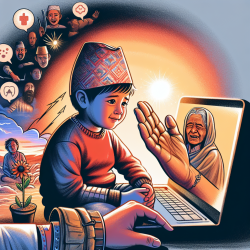Introduction
As practitioners in the field of speech-language pathology and child therapy, understanding the broader psychosocial factors affecting our young clients is crucial. The study titled Interpersonal Violence and Suicidality among Former Child Soldiers and War-Exposed Civilian Children in Nepal by Bhardwaj et al. (2018) offers valuable insights that can enhance our therapeutic approaches. This blog explores the study's findings and suggests practical applications for improving outcomes for children in therapy.
Key Findings of the Study
The research conducted in Nepal highlights significant associations between interpersonal violence (IPV) and suicidality among children exposed to armed conflict. Key findings include:
- 19% of participants reported lifetime suicidal ideation, with a higher prevalence among former child soldiers and females.
- Sexual IPV was strongly linked to suicidal ideation and plans, independent of depression, especially among young women.
- Teacher support was identified as a protective factor against suicidality.
Implications for Practitioners
Understanding these findings allows practitioners to tailor interventions that address the unique needs of children affected by violence and trauma. Here are some strategies to consider:
1. Integrate Trauma-Informed Care
Implement trauma-informed care practices in therapy sessions. Recognize the signs of trauma and provide a safe, supportive environment where children feel understood and respected.
2. Focus on Building Support Networks
Encourage the involvement of teachers and other supportive adults in the child's life. The study emphasizes the role of teacher support in mitigating suicidality, suggesting that practitioners should collaborate with educators to create a supportive network for the child.
3. Screen for IPV and Suicidality
Regularly screen for signs of IPV and suicidal thoughts in children, especially those with a history of exposure to conflict or violence. Early identification can lead to timely interventions and support.
4. Encourage Further Research
The study underscores the need for more research on the intersection of IPV, mental health, and suicidality in low- and middle-income countries. Practitioners should advocate for and participate in research efforts to deepen understanding and improve therapeutic outcomes.
Conclusion
The findings from the Nepal study provide a critical lens through which practitioners can better understand and address the complex needs of children exposed to violence and trauma. By integrating these insights into practice, we can enhance the effectiveness of our interventions and support the mental health and well-being of children in therapy.
To read the original research paper, please follow this link: Interpersonal violence and suicidality among former child soldiers and war-exposed civilian children in Nepal.










